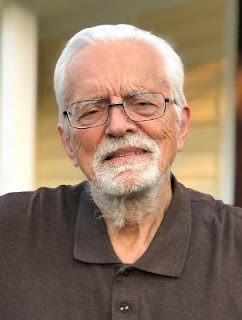HYPERSONNET ON THE
PERILS OF EXPERIENCE
A poverty-rich human yet
non-human thing,
on its way to a great
drain, an authentic pigswill
in the brain and
onset-prone, like a biography
of forgotten
certainties, expropriate and
phantomed in its infant
songs and tears—
an arch under a familiar
sky, its talon tearing
threads out of the
faculties, the four horsemen
of non-apocalyptic
dailyness in their mediated
rags and blankets
wrapped around a shivering,
shrivelled bearer of
identity. Don’t you know
demise is near? Like an
inbred poodle on a re-
ifying leash, running
through the killing fields
of late modernity, a
dying corpse yet struggling
to be free. Long may it
live in the dump and piddle
of its narratives—a
pasty imbricate waiting to be
unvoked in the daily
matrix of our agonies.
Let the great
unthreading come, the bricoleur
of plasticized
nonentity—deity of a new deintegrated
sooth—and take this spry
reality in lower case
into the slickened
regions of untruth, the bloody,
phlegm-besotted underside
of skin and sheath,
clinging to the sticky
carcass of the separate eye.
The Tiger Enters the RAGGED forests of mid-century
It was the year of the
tiger, the mid-century riding
on its beast, the
fighting animal, now subject to resignation
and regret, the death of
the old order’s world-disordered
realm, a dizzying
liminality of unfamiliar space between
the ordinary ceremonies
of experience. And those
aborning in the dark-striped
verticals of solitary predators
and emptiness became
inflamed with brightest orange fur
and glowing
undersides—shapeshifters in ungulate lands,
risking their carefree,
easily insulted lives. You must ask
forgiveness after
killing them, some said, speak
respectfully
with covered head, and
shut all shining embers out of sight—
(the tiger’s yellow
irises are that). A boundary dweller
of the night and a
mage’s familiar he, where threshold
forces stand confronted
by secreted light, a charismatic
mega-faun of ancient
immortality, no less, on its way
to the barnyard of
elemental dread and ordinariness.
School Days in the
Not
once did I notice, even beyond the gravel
pits
near the town limits, any waxy shrubs
with
short stubby branches and dark-red drupes.
Still,
someone
had named the streets High and Main
and
made them intersect in an outburst of poetic
inspiration.
Winters
brought thin powders
of
pockmarked snow, not quite covering
the
swamps around the Morais
I
had written my first poem in Miss Ruhlander's
class
instead of showing her the
crayon drawing
of
Bavarian hills, which prompted unpleasant
associations.
I wish I had never felt Lynn's
perilous
hips on the back-seat exploits
of
our Friday dates. (She likes you, someone
told
me, in sharp intakes of excited breath.)
And
I wish the top floor of Romanik's tailor shop
with
its three cramped rooms had
a sloped roof
like
other houses—our
class president would have
praised
it then, who
lived in downtown-glory
in
a corner mansion that vanished one October
day,
leaving only some
stone pillars in the yard.
Next
year I shall mark my
high-school class’s
absolute
demise by
not attending the five-
year
round of dark-red
memories, still
persisting
with its bash of green perversity.
at a poetry Reading
The chairs around us almost
touch like grasses arched by
teasing winds, the widening
plains ready for the craft of sky
turned inside out like a doughnut,
infinite knot with no undoing,
where shadows like us come
to pause for happy confusions,
works of someone else’s faith
that we drain, adjusting the thirst
in our throats, voiceless.
Show us what you can do,
we seem to say, though you are
giants bound by minikins, words
telling another tease, a notion here,
a semi-insight there, some detail
flushed out of its dense corridor
for us to wander in, then quicken
before others come, brushing
the walls and scraping their small feet
through the remarkable event.
I turn to you, being so close
and seeing our stumbling
moment’s needle touch
on the frail skin we’ve brought
each other more than any rose
turning its ruby petals to the light.
antecedENT truths
If she had not left that
weekend,
if I had kept my furies
to myself,
then we would still be
together
in our swamp of stagnant
water
and brown mist, our
cellar of in-
dicative conditionals
over which
the skiffs of
familiarity floated
like specters rowing
with their
silent oars.
Originally from Ukraine, Askold Skalsky is a retired college professor currently living in Frederick, Maryland. His poems have appeared in over 300 magazines and online journals in the USA as well as in literary publications in Europe, Canada, Australia, and India. His first collection, The Ponies of Chuang Tzu, was published in 2011 by Horizon Tracts in New York City. He is currently at work on a cycle of poems based on Gertrude Stein’s Tender Buttons. A book of poetry, Shapeless Works of Partial Contemplation, will be published by Ephemeral Arts in December 2022.













No comments:
Post a Comment